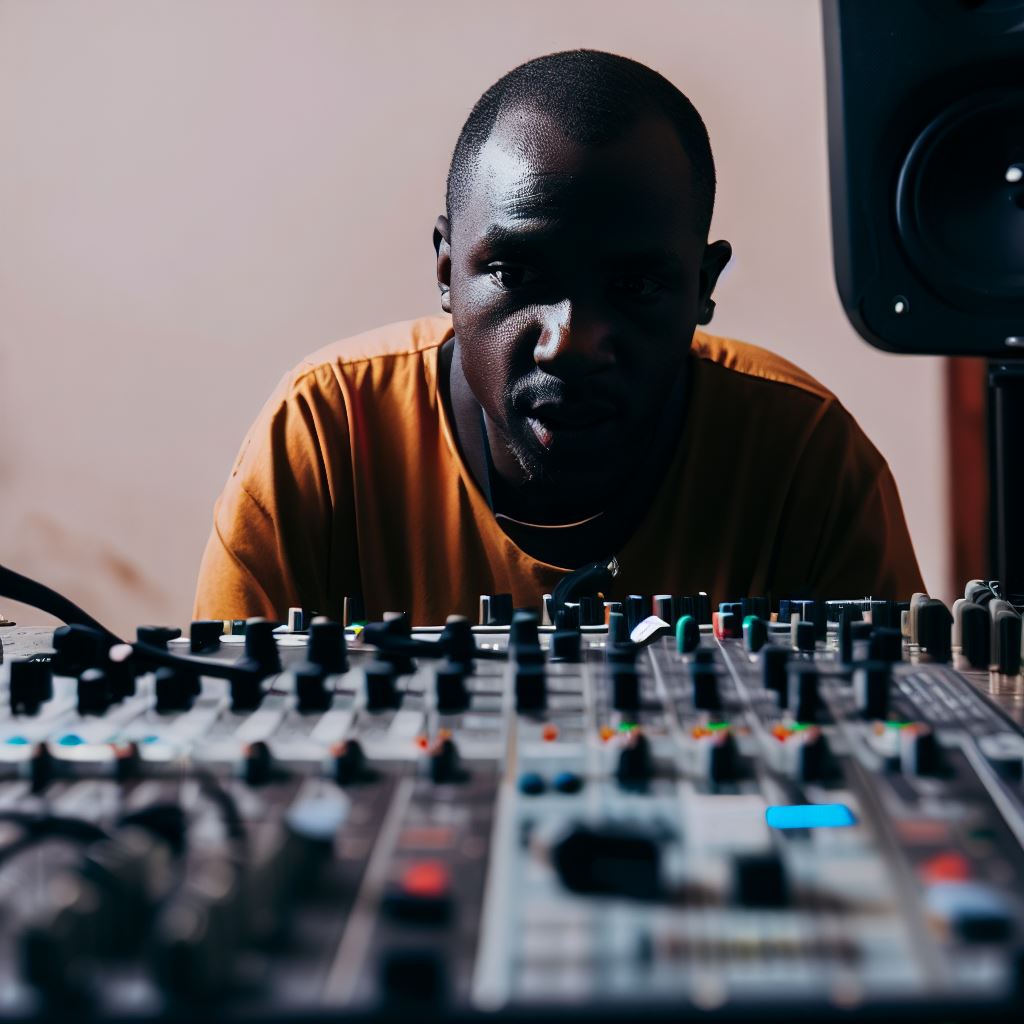Introduction
Sound engineering is the technical and creative process of recording, editing, and mixing sound.
Sound engineering is crucial in the music industry as it enhances the quality and impact of music.
The Nigerian music industry has experienced significant growth and development in recent years.
Sound engineering plays a vital role in creating professional recordings and captivating live performances.
It involves the technical and creative process of recording, editing, and mixing sound to enhance its quality and impact.
In the music industry, sound engineers are responsible for ensuring that every instrument and vocal is balanced, clear, and pleasing to the audience’s ears.
Sound engineering is especially significant in the Nigerian music industry.
Over the past decade, Nigeria has witnessed the rise of Afrobeat and other distinct genres that have gained international recognition.
The country’s music industry has become one of the most vibrant and commercially successful in Africa.
This growth can be attributed to the immense talent pool, entrepreneurial spirit, and the increasing popularity of Nigerian music globally.
With the expansion of the Nigerian music industry, the demand for professional sound engineers has risen significantly.
Sound engineers play a vital role in turning raw recordings into polished tracks that meet international standards.
They collaborate with artists and producers to achieve the desired sound, ensuring that every instrument, vocal, and sound effect blends seamlessly together.
In short, sound engineering is an essential aspect of the music industry, particularly in Nigeria.
It contributes to the growth and development of Nigerian music, enhancing the overall quality and appeal of the recordings and performances.
As the industry continues to thrive, the importance of sound engineering will only continue to increase.
Overview of sound engineering in Nigeria
Evolution of sound engineering in Nigeria
- Sound engineering in Nigeria has evolved significantly over the years.
- It started with basic recording techniques using analog equipment.
- Advancements in technology led to the introduction of digital recording and production techniques.
- Today, Nigerian sound engineers have access to state-of-the-art equipment and software.
Major contributors and pioneers in Nigerian sound engineering
- Chris Odili is considered one of the pioneers of sound engineering in Nigeria.
- He revolutionized the industry by introducing new techniques and equipment.
- Other notable contributors include Oluwole Gbadebo and Jide Benson.
- These individuals have played a significant role in shaping the sound engineering landscape in Nigeria.
Current state and trends in sound engineering
- The sound engineering industry in Nigeria is currently experiencing rapid growth.
- There is an increase in the number of sound engineering schools and training programs.
- Nigerian sound engineers are gaining international recognition for their skills and expertise.
- There is a growing demand for sound engineers in various fields, including music, film, and television.
- New technologies, such as virtual reality and immersive audio, are shaping the future of sound engineering.
In fact, sound engineering in Nigeria has come a long way since its inception.
From basic analog recording techniques to state-of-the-art digital equipment, Nigerian sound engineers have embraced technological advancements.
Pioneers like Chris Odili, Oluwole Gbadebo, and Jide Benson have made significant contributions to the industry.
The current state of sound engineering in Nigeria is promising, with rapid growth and increasing recognition globally.
As new technologies continue to emerge, the future of sound engineering looks exciting and full of potential.
Read: The Role of Sound Engineers in Nollywood Films
Essential tools for sound engineering in Nigeria
In order for sound engineers in Nigeria to deliver high-quality productions and create immersive auditory experiences, there are several essential tools that they rely on.
These tools include:
- High-quality microphones and studio recording equipment: Sound engineers need top-notch microphones and recording equipment to capture the best possible sound.
This includes condenser microphones, dynamic microphones, preamps, audio interfaces, and headphones. - Digital audio workstations (DAWs) and software: DAWs are the central hub for sound engineering projects.
Popular DAWs in Nigeria include Pro Tools, Logic Pro, Ableton Live, and FL Studio.
These software programs allow engineers to edit, mix, and master audio tracks. - Effects processors and plugins: Sound manipulation and enhancement are crucial in creating unique sonic textures.
Effects processors like reverb units, delay units, and compressors, as well as plugins like Waves, FabFilter, and Soundtoys, are commonly used by Nigerian sound engineers.
High-quality microphones and studio recording equipment
One of the foundational tools for sound engineering is a range of high-quality microphones and recording equipment.
Nigeria has a growing community of sound engineers who understand the importance of capturing clean and crisp audio.
Condenser microphones are often used in studio recordings as they capture a wide frequency range and offer great detail.
Dynamic microphones, on the other hand, are durable and ideal for live performances where there may be more ambient noise.
Preamps and audio interfaces are essential for connecting microphones and instruments to the recording setup.
They help amplify and shape the audio signal before it is sent to the digital audio workstation.
Headphones are crucial for sound engineers to accurately monitor the audio while recording, mixing, or mastering.
They provide isolation and allow engineers to hear subtle nuances in the sound.
Digital audio workstations (DAWs) and software used by Nigerian sound engineers
DAWs are the heart of any sound engineering project. They provide the platform for recording, editing, and producing audio.
Nigerian sound engineers utilize various DAWs and software depending on their personal preferences and project requirements.
Pro Tools, developed by Avid, is widely used in Nigeria and around the world.
It offers a comprehensive set of tools for recording, editing, and mixing audio.
Logic Pro, developed by Apple, is another popular choice for its user-friendly interface and powerful features.
Ableton Live is favored by many Nigerian sound engineers for its versatility in both live performances and studio production.
FL Studio, formerly known as Fruity Loops Studio, is highly regarded for its intuitive interface and extensive plugin support.
Effects processors and plugins for sound manipulation and enhancement
Sound engineers in Nigeria employ a range of effects processors and plugins to manipulate and enhance the sound.
These tools allow for creative experimentation and can transform ordinary audio into something extraordinary.
Reverb units are commonly used to add ambience to dry recordings and create a sense of space.
Delay units produce echoes and can be used to add depth and dimension to vocals and instruments.
Compressors are essential for controlling the dynamic range of audio signals.
They can enhance the sustain of vocals or instruments and even out the overall loudness of a mix.
Compression is a key technique in achieving a polished and professional sound.
Plugins, such as those developed by Waves, FabFilter, and Soundtoys, offer a wide range of effects and processing options.
From EQs and filters to distortion and modulation effects, these plugins provide endless possibilities for sound engineers in Nigeria.
In esence, sound engineers in Nigeria rely on a range of essential tools to deliver high-quality audio productions.
From high-quality microphones and recording equipment to digital audio workstations and effects processors, these tools allow for creativity and precision in sound engineering.
Read: Challenges Faced by Sound Engineers in Nigeria
Challenges faced by sound engineers in Nigeria
Limited access to modern and advanced sound engineering equipment
- The sound engineering industry in Nigeria struggles with limited availability of modern equipment.
- Engineers often have to make do with outdated or substandard tools, hindering their ability to deliver high-quality audio.
- The lack of access to advanced equipment hampers the progress and growth of sound engineering in the country.
- Sound engineers in Nigeria face challenges in staying updated with the latest innovations and technology in the field.
Lack of standardized training and professional certifications
- Nigeria lacks a standardized training framework for sound engineers, leading to inconsistent skill levels.
- Without proper accreditation or certification, it becomes difficult for engineers to establish their expertise and credibility.
- This lack of standardized training also poses a challenge in establishing a cohesive and competent sound engineering community.
- Professional certifications would not only validate skills but also contribute to improving the overall quality of sound engineering in Nigeria.
Financial constraints and pressure for cost-cutting measures
- Sound engineers often face financial constraints due to limited budgets allocated for audio production.
- This leads to compromises and challenges in ensuring optimal sound quality and equipment maintenance.
- Pressure for cost-cutting measures further exacerbates the challenges faced by sound engineers in Nigeria.
- Without adequate financial support, it becomes challenging to invest in better equipment or hire competent professionals.
Overall, the challenges faced by sound engineers in Nigeria reveal the need for improvements in various aspects of the industry.
Access to modern and advanced sound engineering equipment must be prioritized to ensure high-quality audio production.
The establishment of standardized training programs and professional certifications would help build a skilled and reputable sound engineering community.
Additionally, financial support and recognition of the value of sound engineering are essential for overcoming obstacles and promoting excellence in the field.
By addressing these challenges, Nigeria can foster a thriving sound engineering industry that enriches its cultural landscape and contributes to the global audio production community.
Read: Salary Overview: Sound Engineers in Nigeria

Strategies and solutions for Nigerian sound engineers
Collaboration and Knowledge Sharing within the Industry
- Sound engineers in Nigeria should form networks and collaborate with each other.
- Sharing knowledge, techniques, and experiences can help elevate the whole industry.
- Organizing workshops, conferences, and seminars can facilitate knowledge sharing among professionals.
- Collaboration with other music professionals like producers and musicians can enhance the sound engineering process.
- Establishing online communities and forums can provide a platform for sound engineers to connect and learn from each other.
Utilizing Cost-Effective Alternatives and DIY Approaches
- Due to limited resources, Nigerian sound engineers need to explore cost-effective alternatives.
- Investing in affordable equipment and software can still yield high-quality results.
- DIY approaches, such as building soundproof booths or using homemade acoustic panels, can save costs.
- Upcycling or repurposing old equipment can be a practical solution for budget constraints.
- Conducting thorough research on affordable but reliable gear can help Nigerian sound engineers make informed choices.
Advocacy for Improved Infrastructure and Government Support
- Nigerian sound engineers should unite to advocate for improved infrastructure in the industry.
- Better-equipped studios, venues, and performance spaces are essential for sound engineers to excel.
- Engaging with relevant government agencies and policymakers can raise awareness about the needs of the industry.
- Lobbying for financial support and incentives from the government can help boost the sound engineering sector.
- Collaborating with industry associations and organizations can increase the collective strength in advocating for change.
Therefore, Nigerian sound engineers can overcome challenges and thrive in their profession by adopting effective strategies.
Collaboration and knowledge sharing within the industry can elevate the skill level and foster a sense of community among professionals.
Utilizing cost-effective alternatives and embracing DIY approaches can help overcome financial constraints.
Advocacy for improved infrastructure and government support is crucial to create an enabling environment for sound engineers to excel.
By implementing these strategies and working together, Nigerian sound engineers can enhance the quality of their work and contribute to the growth of the industry.
Read: Nigerian Sound Engineers: Success Stories
Gain More Insights: Job Growth for Casino Hosts: Nigeria’s 2023 Outlook
Success stories of Nigerian sound engineers
Notable projects and collaborations showcasing Nigerian talent and expertise
- Nigerian sound engineer, Femi Akintunde, worked on the Grammy-nominated album, “African Giant” by Burna Boy.
- Paul Okoye, a renowned Nigerian sound engineer, has collaborated with top artists like Tiwa Savage and Davido.
- DJ Spinall, a Nigerian sound engineer, has produced hits for Wizkid, Burna Boy, and other A-list Nigerian artists.
- Sarz, an acclaimed Nigerian producer and sound engineer, has worked on internationally acclaimed albums like Beyoncé’s “The Lion King: The Gift”.
- Cobhams Asuquo, a Nigerian sound engineer, has produced chart-topping songs for numerous Nigerian artists, including Asa and Bez.
Recognition and achievements of Nigerian sound engineers on national and international platforms
- Nigerian sound engineer, Michael Collins, popularly known as Don Jazzy, co-founded Mo’ Hits Records, one of Nigeria’s most successful music labels.
- Young John, a Nigerian sound engineer, won the City People Entertainment Award for Music Producer of the Year in 2017.
- Suka Sounds, a Nigerian sound engineer, won the award for Best Sound Engineer at The Headies in 2019.
- Sound Sultan, a Nigerian sound engineer, won the award for Best Sound Engineer at the Nigerian Entertainment Awards in 2012.
- Clarence Peters, a renowned Nigerian sound engineer, has won multiple awards for his work as a music video director.
Impact of Nigerian sound engineers in shaping the music industry
Nigerian sound engineers have played a crucial role in shaping the music industry in the country and beyond.
Their expertise and talent have contributed to the growth and international recognition of Nigerian music.
By working on notable projects and collaborations, Nigerian sound engineers have showcased the quality of their work and the richness of Nigerian music.
This has led to increased opportunities and recognition for both the engineers and the artists they work with.
The achievements of Nigerian sound engineers on national and international platforms have also highlighted the importance of their role in the music industry.
They have proven that Nigerian engineers can compete with their counterparts from around the world and deliver exceptional results.
Furthermore, Nigerian sound engineers have influenced the production styles and techniques used in the music industry.
They have introduced unique and innovative approaches that have shaped the sound of Nigerian music and made it distinct from other genres.
Basically, Nigerian sound engineers have achieved notable success stories through their work on influential projects, collaborations, and recognition on national and international platforms.
They have greatly impacted the music industry by showcasing Nigerian talent and expertise and shaping the sound of Nigerian music.
Future prospects for sound engineering in Nigeria
Positive growth indicators and opportunities for expansion
- Nigeria’s music industry continues to grow, creating a high demand for sound engineers.
- The rise of digital music platforms and streaming services allows sound engineers to reach a wider audience.
- Increasing music festivals, concerts, and events in Nigeria open up more opportunities for sound engineering.
- The Nigerian film industry, Nollywood, is also expanding, leading to increased demand for sound engineers in film production.
- Collaborations between Nigerian musicians and international artists create global exposure and further opportunities for sound engineers.
Role of technology advancements in shaping the future of sound engineering
- Advancements in recording, editing, and mixing software provide sound engineers with more precise and efficient tools.
- Hardware upgrades such as high-quality microphones, audio interfaces, and studio equipment enhance the production value of sound engineering.
- Virtual reality (VR) and augmented reality (AR) technologies present new possibilities for immersive audio experiences.
- Emerging audio technologies like spatial audio and ambisonics offer unique sound design possibilities for sound engineers.
- Artificial intelligence (AI) and machine learning can assist sound engineers in automating certain tasks and improving workflow efficiency.
Importance of continuous learning and evolving with industry trends
- Sound engineers must stay updated with the latest trends in music production, recording techniques, and equipment.
- Attending workshops, conferences, and training sessions can help sound engineers acquire new skills and knowledge.
- Networking with other professionals in the industry allows sound engineers to stay connected and learn from each other.
- Keeping up with evolving industry standards ensures sound engineers remain competitive in the market.
- Adapting to changing audience preferences and embracing new genres and styles is crucial for sound engineers to stay relevant.
In a nutshell, the future of sound engineering in Nigeria looks promising with positive growth indicators and numerous opportunities for expansion.
The role of technology advancements plays a significant part in shaping the future of sound engineering, providing sound engineers with advanced tools and possibilities.
However, continuous learning and evolving with industry trends are equally important for sound engineers to stay competitive and relevant in the dynamic field of sound engineering.
By embracing these factors, the sound engineering industry in Nigeria can thrive and contribute to the vibrant music and film culture of the country.
Conclusion
Recap of key points discussed
Throughout this section, we have explored the tools of the trade for sound engineering in Nigeria.
We have learned about the essential equipment, such as mixing consoles, microphones, and digital audio workstations.
Final thoughts on the significance of sound engineering in Nigeria
Sound engineering plays a crucial role in Nigeria’s music and entertainment industry.
It ensures high-quality audio production, resulting in enjoyable experiences for audiences and increased demand for Nigerian music globally.
Encouragement for aspiring sound engineers to pursue their passion and contribute to the industry’s growth
To aspiring sound engineers, we encourage you to pursue your passion and contribute your skills to the industry’s growth.
With the right training and dedication, you can become an integral part of the Nigerian music scene, supporting artists and creating memorable sounds. Sound engineering in Nigeria is an exciting and essential field.
It requires technical expertise, creativity, and a deep understanding of music production.
Aspiring sound engineers have the opportunity to make a significant impact on the industry’s growth and contribute to Nigeria’s vibrant music culture.
So, go ahead and follow your passion for sound engineering to new heights.




